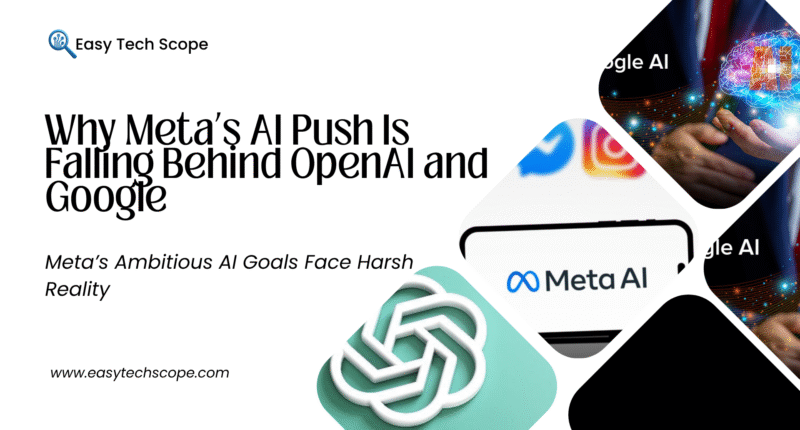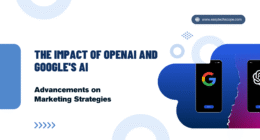Introduction
As the technological landscape evolves, artificial intelligence (AI) continues to emerge as a pivotal area of innovation, with companies like OpenAI and Google leading the charge. Meanwhile, Meta, formerly known as Facebook, finds itself grappling with unique challenges in establishing its own foothold within this competitive space. Understanding why Meta’s AI initiatives are lagging requires an in-depth look at several key factors, including strategic focus, innovation capabilities, data access, and community engagement.
The Landscape of AI Development
Navigating the AI landscape requires a keen awareness of emerging trends and technologies. Major players, such as OpenAI and Google, have positioned themselves at the forefront through aggressive research and development, well-defined strategies, and robust ecosystems. A glance at their key products – OpenAI’s GPT models and Google’s various AI frameworks and tools – reveals a commitment to pushing the boundaries of what AI can achieve.
On the other hand, Meta’s AI efforts often seem fragmented, characterized by internal restructuring and an unclear vision. This creates a disparity that affects both users and developers who seek reliable AI tools for their projects.
Meta’s Strategic Challenges
Meta’s strategic challenges stem from several core issues that hinder its potential in AI:
- Ambiguous Priorities: The company’s dual focus on social media and AI development creates conflicting priorities. This divided attention can dilute efforts in advancing AI technologies.
- Reputation Management: Overcoming public relations issues, including data privacy scandals, means that Meta must invest significant resources in rebuilding trust. This focus on reputation management detracts from nurturing innovation.
- Funding and Resource Allocation: While Meta allocates substantial funding toward AI, the effectiveness of its investments can be questioned. Unlike OpenAI, which has extensive backing from strategic partnerships and a clear mission, Meta’s AI initiatives sometimes appear disjointed or inadequately supported.
- Internal Organizational Structure: Internal competition for resources and attention can limit the breadth of Meta’s AI development. With a myriad of teams working on different AI projects, coherent communication and collaboration may suffer.
These challenges collectively contribute to the perception that Meta is not capitalizing effectively on its opportunities in the AI space.
The OpenAI Advantage
OpenAI distinguishes itself through several competitive advantages that boost its position:
- Cutting-edge Research: Known for its transformational models, OpenAI invests heavily in research, resulting in advanced capabilities and high-profile projects such as ChatGPT and DALL-E. This commitment to product excellence fosters user trust.
- Partnerships and Collaborations: OpenAI has collaborated with industry giants, including Microsoft, which provides both technological infrastructure and financial resources. These partnerships facilitate rapid advancements and wider distribution of AI tools.
- Community Engagement: OpenAI’s proactive approach to community engagement enables users to contribute feedback that helps enhance performance. Building a user-driven ecosystem has proven invaluable in fostering a dedicated following.
- Clear Mission and Vision: A well-defined mission to ensure that artificial general intelligence benefits humanity helps OpenAI steer its developments toward significant societal impacts.
Google’s Groundbreaking Innovations
Google’s robust approach to AI has yielded numerous breakthroughs that set it apart from competitors. Its large ensemble of products exemplifies advanced integration of AI across platforms and applications:
- TensorFlow: This open-source library has become the go-to for researchers and developers alike, making machine learning more accessible. Its ongoing updates and extensive community support bolster Google’s influence on the AI landscape.
- Bard and Google Assistant: Innovative AI products like Bard and an ever-evolving Google Assistant showcase the practical applications of AI technology in daily life, enhancing user interactions.
- Search Engine Integration: Google seamlessly integrates AI into its algorithms, resulting in significant advancements in search capabilities, personalization, and user experience. This demonstrates the versatility of AI as a powerful tool for enhancing existing services.
- Massive Data Infrastructure: Google benefits from unparalleled data collection and processing capabilities. The breadth of data collected from diverse services gives Google an edge in training more effective and nuanced AI models.
The Role of Data in AI Success
Data plays a crucial role in the development of AI technologies, acting as the foundation upon which models are built. The sheer volume and variety of data that a company possesses significantly influence its capability to innovate and improve AI systems.
- Access to Diverse Datasets: OpenAI and Google leverage vast datasets that allow them to train more advanced algorithms. This access is critical, as it drives better model performance and applicability.
- Quality over Quantity: While data quantity is important, the quality of the data also matters. Google, for instance, benefits from a wealth of superior-quality user data derived from billions of daily interactions, resulting in more robust AI solutions.
- Ethical Considerations: Data collection raises ethical questions. Companies like OpenAI prioritize transparency, focusing on responsible AI development, while Meta continues to navigate the implications of its data practices.
- Feedback Loops: Continuous learning from user interactions leads to iterative improvements in AI models. Both OpenAI and Google excel in incorporating user feedback into their development cycle, ensuring a more refined product over time.
User Engagement and Community Support
A thriving user community can significantly impact the growth and adoption of AI technologies. OpenAI and Google actively foster communities that contribute to their platforms:
- User-Driven Development: Engaging users in the development process creates loyalty. Programs that encourage feedback and collaboration help build a committed community around AI initiatives.
- Educational Resources: Google and OpenAI provide extensive resources, from documentation to tutorials, facilitating user onboarding and engagement. By investing in educational material, these companies empower users and developers.
- Responsive Support Systems: High-quality customer support systems that handle inquiries swiftly help maintain user trust. The responsiveness of OpenAI and Google in addressing concerns enhances user satisfaction and loyalty.
- Event Participation and Conferences: Actively participating in industry events allows these companies to demonstrate innovations and gather feedback from potential users. Meta, in contrast, has struggled to maintain a positive perception in public forums and tech discussions.
Regulatory Challenges and Ethical Considerations
The evolving landscape of AI development comes with increasing scrutiny from regulatory bodies and ethical considerations:
- Governance and Compliance: OpenAI and Google have taken proactive measures to comply with regulations regarding data privacy, ensuring they build systems that align with ethical standards.
- Commitment to Responsible AI: Establishing an ethical framework for AI technologies has become essential. OpenAI, for instance, prioritizes ethical considerations in research and deployment, addressing potential risks proactively.
- Managing Public Perception: Meta has faced significant challenges with public trust due to its history with data privacy issues. This mistrust acts as an impediment to its advancements in AI, with potential misuse raising concerns among users.
- Future Regulatory Environment: As governments worldwide contemplate new regulations on AI, Meta must balance innovation with compliance, which could create further delays in product development.
The Future of AI: What Lies Ahead
The future of AI development is poised for exponential growth as technology continues to evolve. Here are key areas to monitor:
- Enhanced Collaboration: Collaboration among tech companies, researchers, and regulators may lead to more standardized practices and better frameworks for ethical AI deployment.
- Multimodal AI: The integration of diverse data types (text, audio, image) into cohesive AI systems will redefine capabilities. Companies that excel in this area, like OpenAI and Google, will lead the next wave of AI advancements.
- User-centric Innovations: AI tools designed with user experience in mind will become increasingly vital. Companies that prioritize usability and accessibility will gain a competitive edge in attracting users.
- Investment in Talent: The demand for AI specialists continues to outpace supply. Companies that invest in talent development and create inclusive opportunities will emerge stronger in the competitive landscape.
Conclusion: The Road Ahead for Meta
Meta faces a unique set of challenges as it seeks to elevate its AI efforts amidst formidable competition from industry leaders. While it possesses considerable resources and brand recognition, a clear, coherent vision paired with robust execution is essential to close the gap with OpenAI and Google. By addressing strategic challenges, improving data practices, enhancing user engagement, and navigating ethical concerns, Meta can redefine its presence in the AI space.
The road ahead is paved with challenges and opportunities, and only time will tell if Meta can rise to the occasion and recapture its innovative spirit in the world of artificial intelligence.









